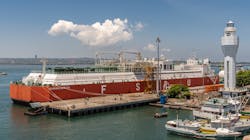Germany advances FSRU projects to ensure gas supply
Offshore staff
BERLIN – Four floating storage and regasification units are planned for deployment offshore Germany along with two permanent onshore sites, with an emphasis upon the FSRUs to help secure near-term and medium-term gas supplies.
The German government has earmarked 2.94 billion euros ($3.07 billion) for the projects, set to be developed by utilities RWE and Uniper, respectively. The government has acted quickly in recent weeks to charter four FSRUs, two via Uniper and two via RWE. Germany’s economy ministry says that it hopes to begin operations at two FSRUs – one at Wilhelmshaven and one at Brunsbuttel – before the end of 2022.
The port city of Hamburg, as well as Rostock on the Baltic Sea, have also been suggested as possible locations for an FSRU.
The plan is a key part of Germany’s efforts to ensure the continuity of gas supply in the wake of Russia’s suspension of gas deliveries to European markets. That suspension is part of Russia’s response to the western sanctions regime that followed Russia’s invasion of Ukraine.
On June 23, Germany became the first country in Europe to move to the second level of its three-stage emergency gas plan, highlighting its vulnerability to Russian supply disruption.
Uniper’s plans for Wilhelmshaven also includes an import terminal for ammonia, an electrolysis plant to turn that into clean hydrogen, and a clean hydrogen storage unit at Krummhoern.
Besides the FSRUs, Germany needs LNG supply. The country has held talks with Qatar and Canada on the potential for LNG supply deals, while utilities EnBW and RWE are also eyeing long-term deliveries of US LNG.
07.04.2022
